The foreign relations of South Africa have spanned from the country's time as a Dominion of the British Empire to its isolationist policies under apartheid to its position as a responsible international actor taking a key role in Africa, particularly Southern Africa. South Africa is a member of the United Nations, the African Union and the Commonwealth of Nations. Considered a possible permanent addition to the United Nations Security Council, South Africa was elected in 2006, 2010 and 2018 by the UN General Assembly to serve on the Security Council. South African President Cyril Ramaphosa was the chair of the African Union from 2020 to 2021, the second time South Africa has chaired the organisation since its formation in 2003.
Global Affairs Canada is the department of the Government of Canada that manages Canada's diplomatic and consular relations, promotes Canadian international trade, and leads Canada's international development and humanitarian assistance. It is also responsible for maintaining Canadian government offices abroad with diplomatic and consular status on behalf of all government departments.

The Minister of Foreign Affairs is the minister of the Crown in the Canadian Cabinet who is responsible for overseeing the Government of Canada's international relations and is the lead minister responsible for Global Affairs Canada, though the minister of international trade leads on trade issues. In addition to Global Affairs Canada, the minister is also the lead in overseeing the International Centre for Human Rights and Democratic Development and the International Development Research Centre.
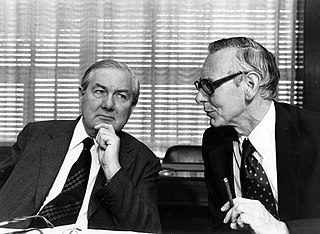
In many countries, the ministry of foreign affairs is the highest government department exclusively or primarily responsible for the state's foreign policy and relations, diplomacy, bilateral, and multilateral relations affairs as well as for providing support for a country's citizens who are abroad. The entity is usually headed by a foreign minister or minister of foreign affairs. The foreign minister typically reports to the head of government.

The Minister of Foreign Affairs, also known as the Foreign Minister, is a senior minister in the New Zealand Government heading the Ministry of Foreign Affairs and Trade and responsible for relations with foreign countries.

The Department of Foreign Affairs and Trade (DFAT) is the department of the Australian federal government responsible for foreign policy and relations, international aid, consular services and trade and investment. Australia's total official development assistance (ODA) decreased in 2022 due to differences in Australia's financial year reporting and the timing of its COVID-19-related expenditure, representing 0.19% of gross national income (GNI).

Israel–South Africa relations refer to the current and historic relationship between the Republic of South Africa and the State of Israel. As of January 2024, South Africa maintains only “limited political and diplomatic interaction” with Israel due to the ongoing Israeli–Palestinian conflict.
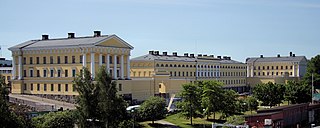
The Ministry for Foreign Affairs (MFA) is a ministry in the Finnish Government and is responsible for preparing and implementing the government's foreign policy.

The Ministry of External Affairs of India is tasked with formulating and implementing Indian foreign policy, in tandem with the repatriation of Indian citizens and the extradition of fugitives. The Ministry of External Affairs is steered by the Minister of External Affairs, a minister in the PM's Cabinet.

Brazil–South Africa relations are the bilateral relations between the Federative Republic of Brazil and the Republic of South Africa. Both nations are members of the BRICS, Cairns Group, G20, Group of 24, Group of 77 and the United Nations.
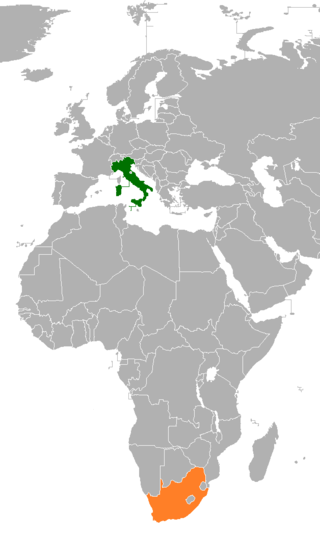
Italy–South Africa relations are the bilateral relations between Italy and South Africa. Both countries established diplomatic relations in 1929. Italy has an embassy in Pretoria, a consulate-general in Johannesburg and a consulate in Cape Town. South Africa has an embassy in Rome. Both countries are members of the G20.
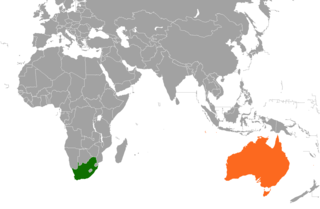
The Commonwealth of Australia and the Republic of South Africa formally established diplomatic relations in 1947. Australia is home to one of the largest South African communities abroad with approximately 189,230 South Africans living in the country. Both countries are members of the Cairns Group, Commonwealth of Nations, G20, Indian Ocean Rim Association and the United Nations.

Maite Emily Nkoana-Mashabane, formerly known as Maite Mohale, is a South African politician who served as the Minister of Women, Youth and Persons with Disabilities. She was Minister of Rural Development and Land Reform from 2018 to 2019, and previously served as Minister of International Relations and Cooperation from 2009 to 2018. Nkoana-Mashabane is also a former member of the National Executive Committee of the African National Congress (ANC).

Malaysia–South Africa relations refers to the current and historical relationship between Malaysia and South Africa. Malaysia has a high commission in Pretoria, and South Africa has a high commission in Kuala Lumpur. Relations between the two countries have been very good and have continued to improve, with each other view themselves as close partners in the developing world. Both are full members of the Commonwealth of Nations.

Pakistan–South Africa relations refers to the current and historical relationship between the Republic of South Africa and the Islamic Republic of Pakistan. Both are former British colonies and full members of the Commonwealth of Nations.

The Republic of Singapore and the Republic of South Africa are independent countries which have achieved independence from Great Britain and currently maintain friendly bilateral relations. The connections between the two countries are based primarily on their membership in the Commonwealth of Nations, and their interactions in international trade and tourism. Both countries also cooperate in social and economic development issues.
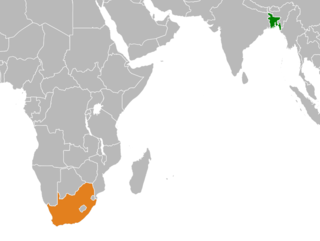
Bangladesh–South Africa relations refer to the bilateral relations between Bangladesh and South Africa. Bangladesh has a High Commission in Pretoria. The South African High Commission in Colombo is accredited to Bangladesh. Both countries are members of the Commonwealth of Nations.

India–São Tomé and Príncipe relations refers to the international relations that exist between India and São Tomé and Príncipe (STP). India has an embassy in São Tomé. STP maintains an Honorary Consul in New Delhi.

South Africa-Trinidad and Tobago relations refers to the bilateral relations between South Africa and Trinidad and Tobago. Diplomatic relations were established on 10 January 1995. Both nations are members of the Commonwealth of Nations.
Union for the Local Employees in Missions Accredited to South Africa (ULEMASA) is a trade union formed by local employees working for diplomatic missions in South Africa.

















